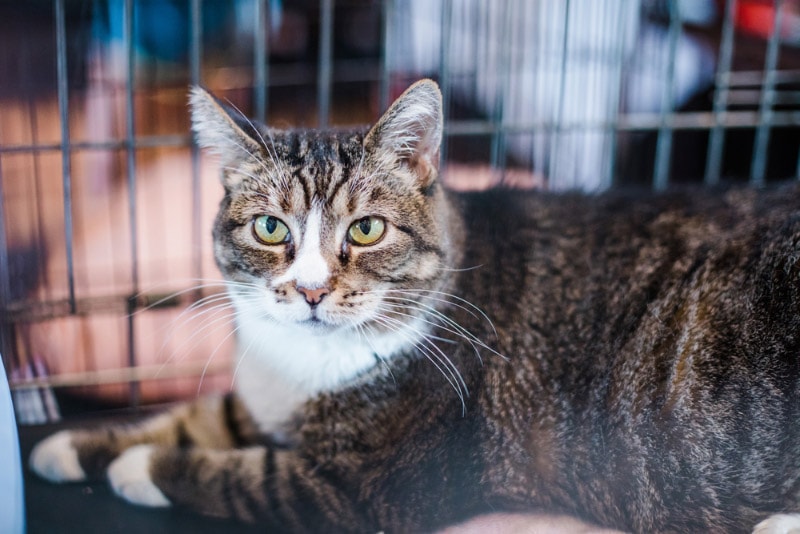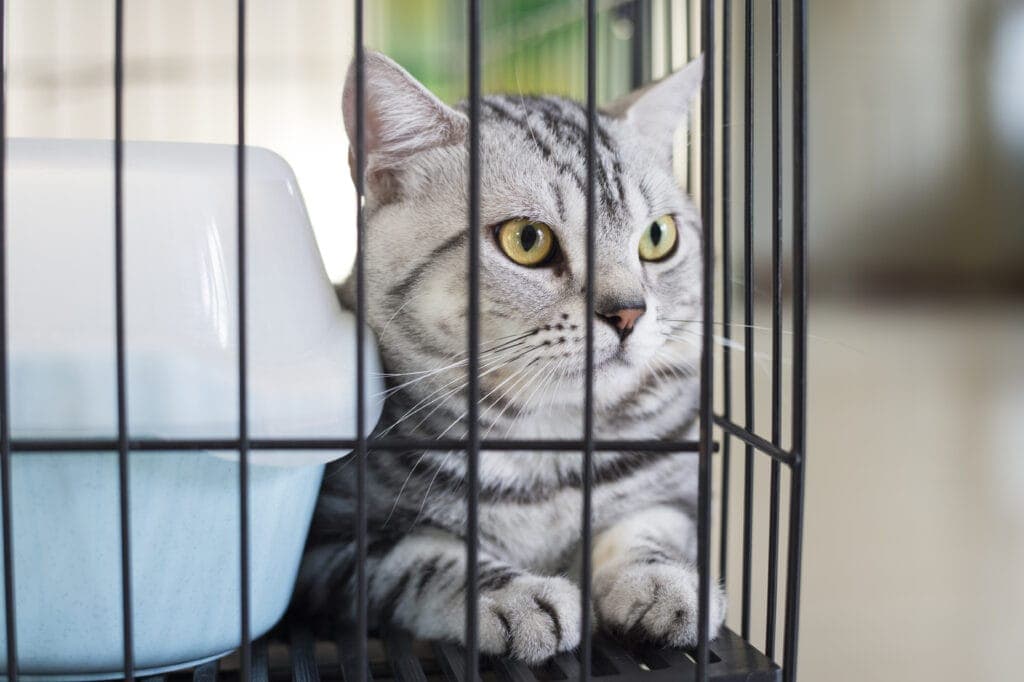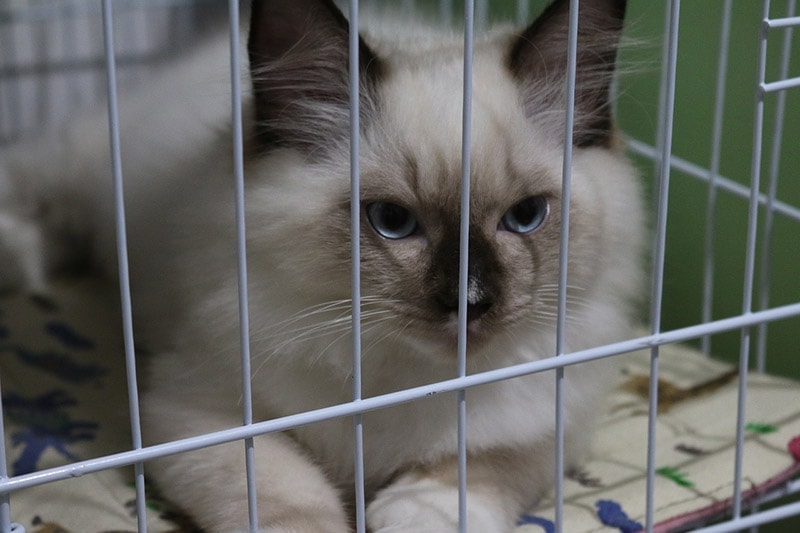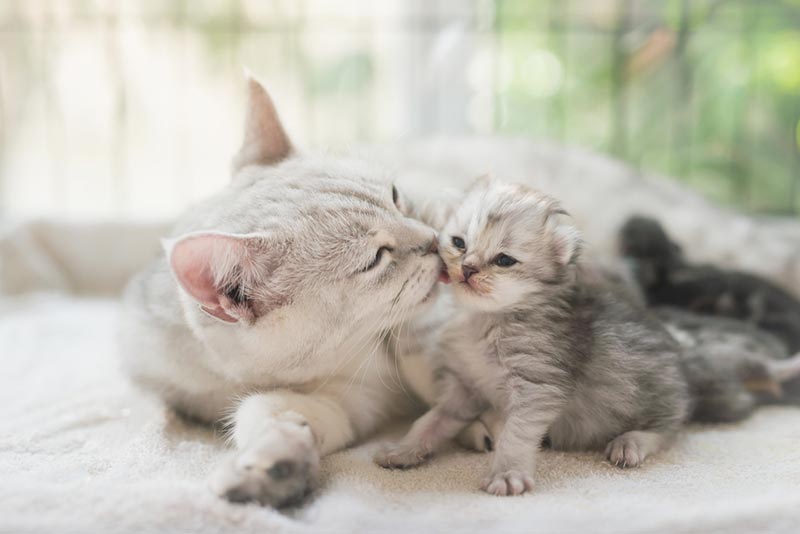VET APPROVED

The information is current and up-to-date in accordance with the latest veterinarian research.
Learn more »There are varying opinions on whether it is ethical to keep your cat in a crate. In some instances, it may be necessary for your cat’s safety or a medical reason. There are factors to consider before making the final decision on whether crating your cat during the night may be beneficial to both you and your cat.
We have looked into many different views on crating, both from cat owners and veterinarians themselves. We have created this article to help you determine if crating your cat is necessary and provide you with tips to create a comfortable crate for your cat if you do decide that it is the best option.

Is It Bad to Put Your Cat in a Crate?
A content, calm, and well-behaved cat should not require a crate at night unless it has been specifically recommended by your veterinarian for a medical reason. While crates are not necessarily bad for cats, they can have specific effects on their mental health, causing boredom and changes in their behavior.
Most cats do not enjoy being cooped up in a small space. They may begin to show significant behaviors that indicate they are stressed. Cats are crepuscular, meaning they are most active during dawn and dusk, and many owners may find their nighttime habits frustrating. Your cat will begin to show increased levels of activity and may even keep you up at night. Most cat owners have ‘trained’ their cats to be more active during the day in the hopes that their feline will be sleeping through the night. However, your cat’s personality will determine when they are most active and sometimes it is nearly impossible to swap your cat’s biological clock.
Furthermore, cats may develop behavioral problems from being kept in a crate throughout the night. This can be through anxiety, fear, distress, discomfort, and boredom. If your cat does not sleep during the night, they may spend most of their time trying to figure out how to escape the crate. If you plan to put them in a crate to keep them quiet and contained while you try to sleep, then it may have the opposite effect.

The Expert Opinion
Many veterinary professionals advise that you should not keep your cat in a crate for more than 6 hours. If the average person sleeps between 7 to 9 hours a night, it is easy to exceed this time frame. You should never keep your cat in a crate to punish them, as they are unable to understand why they are being locked up, and this will lead to further frustration and anxiety associated with the crate itself.
It’s important to also differentiate a crate from a cat carrier. Cat carriers are much smaller and generally have only enough space for your feline friend to be comfortable without food or water bowls or a litter box. Their purpose is transporting cats for short-distance travel, such as to their vet.
When Should You Put Your Cat in a Crate?
- The best reason for a cat to be crated at night is if your cat’s veterinarian recommends it. If this is the case, then it may only be for a few nights until your cat has healed from a possible injury or surgery.
- If your cat tries to escape at night and is not sterilized, then it may be necessary to crate them overnight until they are spayed or neutered. An unsterilized cat will try to escape to find other cats in the neighborhood. Since you may not be able to keep every exit closed at all times, a crate may be used.
- You can consider using a crate if you are introducing a new pet and you want to get them slowly and gradually used to each other without actual physical contact.
- Crates may be useful for keeping your cat away from renovations or housework being done, or children and other pets that may be visiting that your cat is not accustomed to.
- Your cat, especially a young one or a kitten, gets up to mischief at night and you want a secure way to prevent your cat from potentially hurting themselves when you cannot watch them.
- In multi-cat households, it is not uncommon for your cats to get into minor disagreements with each other. A crate may then be necessary to keep the dominant cat from lashing out on the rest of the cats. However, this should only be used as a temporary measure until you can speak to your vet and find the reason your cats are not getting along. Pain and illness can be a cause for a cat’s aggressiveness.
Choosing the Right Crate

A crate should meet the following criteria to ensure that your cat is kept comfortable during the night.
The crate should be large enough for your cat to turn around and stand up straight without touching the roof. There should also be enough space for your cat’s litter box and food and water bowls. The bottom of the crate should be covered by a soft blanket or towel and the crate should have adequate ventilation. If your cat is particularly active at night, then you may want to give them a few toys to play with, but ensure that it is not a potential choking or swallowing hazard for your cat.
When choosing a suitable area in the house for your cat’s crate, take the weather conditions into account. Your cat will not feel comfortable in a hot and humid room as there is nowhere they can escape these conditions. If your house gets particularly cold at night, then adding a plush blanket into the crate can provide your cat with warmth. Keep the crate away from cold drafts, but the room should still have adequate cross-ventilation.
Or, you could opt for a bed that is not only practical and modern but provides maximum comfort for your cat. The innovative Hepper Nest features a unique bowl shape that caters to the specific needs of felines. In addition to offering a cozy spot for your cat to sleep, its flat base and compact design make it the perfect bed to set up virtually anywhere so your kitty can lounge wherever you go. Click here to learn more about this remarkable cat bed.
At PangoVet, we’ve admired Hepper for many years and decided to take a controlling ownership interest so that we could benefit from the outstanding designs of this cool cat company!

Final Thoughts
Always consult your vet or a feline behaviorist before placing your cat in a crate during the night. If there are certain behaviors that your cat is displaying which might be why you choose to crate your cat, then the behaviorist will be able to help find the cause of possible stressors and advise you on how your cat can overcome them. Crating a cat should never be a punishment, and a cat should first be properly and gradually trained on how to use a crate so that they can feel comfortable and safe in it.
Although crating your cat for a few hours is not necessarily harmful, other factors should be considered with the help of feline professionals before crating is used as a last resort, as some cats will experience stress and anxiety when crated.
See also:
Featured Image Credit: zskstars, Pixabay












